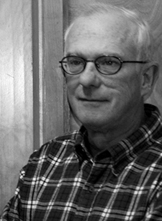Honored for a career of scholarly prowess
Albert Hamscher is named the Kenneth S. Davis Professor of History
 Colleagues rely on his expertise in the field of early modern France, and undergraduates flock to his course on death and dying. Such diverse interests, and a career dedicated to passing that knowledge on, have earned Albert Hamscher recognition as the Kenneth S. Davis Professor of History.
Colleagues rely on his expertise in the field of early modern France, and undergraduates flock to his course on death and dying. Such diverse interests, and a career dedicated to passing that knowledge on, have earned Albert Hamscher recognition as the Kenneth S. Davis Professor of History.
The position was established in a bequest to the department from Davis, a writer and historian best known for his multivolume work on Franklin D. Roosevelt, said Sue Zschoche, associate professor and chair of the history department.
It was Davis' wish that the post be awarded to a department member with a general record of excellence in scholarship, but also with important attention to teaching, Zschoche said.
"According to the memo of understanding with Davis," Zschoche said, "the scholar chosen had to show ‘an appreciation of the connectedness of the human experience' and had to have ‘compiled a general record of professional excellence and have shown special success in teaching.'
"For more than 30 years, Al Hamscher has compiled an unrivaled record of excellence in scholarship and in teaching and is incredibly worthy of this honor."
Hamscher teaches European and French history but is particularly known for his course "The History of Death and Dying," which Zschoche said is one of the most popular courses in the department.
"There are only two constants in the universe -- death and taxes," Hamscher said of the course he created at students' request. "We spend a lot of time studying taxes, but not death. The subject is somewhat exotic and mysterious, and I think it attracts young minds because it's something we're all curious about."
Beyond the popularity of that particular class, Hamscher is a student favorite.
"Over the years, he has earned superb teaching evaluations," Zschoche said. "Perhaps most significant are the testimonies of former students, all of which speak to his extraordinary ability to ‘kindle the desire' to learn."
In teaching, Hamscher finds it most rewarding when students are able to find relationships between seemingly unconnected things.
"In my upper division courses, I don't want students to simply regurgitate things that I've told them," he said. "I like independent and creative thinking."
Hamscher has been at K-State since 1972; he was promoted to full professor in 1986. He has written several books, many articles and several book chapters on the history of early modern France. He was one of the two founders of the revisionist school on royal absolutism.
His work has been widely cited in research, and his reputation in the field has earned him election to the Société de l'Histoire de France and a year's residence at the Institute for Advanced Study in Princeton, N.J., Zschoche said.
Hamscher has also published extensively and edited a book on the cultural history of American cemeteries. He was a consultant and participant on a PBS program on death and dying in Kansas.
Highly regarded for both his scholarship and teaching, Hamscher's awards include the Conoco Foundation Outstanding Undergraduate Teaching Award, three William Stamey Outstanding Undergraduate Teaching Awards and K-State's Distinguished Graduate Faculty Award. He has also served on the boards of editors of French Historical Studies and the University Press of Kansas.
Hamscher will hold the Davis chair until his retirement.
"I am honored by this award," Hamscher said. "I've always tried hard to be both a productive research scholar and an effective teacher."